The questions came one after the other, to the point where some kids were worried Derrick Coleman wouldn't eventually see their raised hands.
The students at the Phoenix Day School for the Deaf had already listened for almost 30 minutes, their eyes fixed not on Coleman but next to him, where a teacher used sign language to distribute Coleman's message. Coleman, the first legally deaf offensive player in NFL history, wore a broad smile and spoke in a big voice, albeit one altered by the way he had to learn to talk.
The Cardinals' fullback knew each of those raised hands meant something already. A big part of what he wanted kids to understand was that they couldn't be shy. It's a key lesson learned for all people really, but for those dealing with deafness or hearing impairment, it is crucial.
Coleman doesn't think he'd be in the NFL otherwise.
"It means you can't be afraid to fail," Coleman said later, sitting down to talk about his well-known story. "You can't be afraid to ask for something. Especially when it's something to overcome your hearing loss.
"When you are out in the world and you don't want to be left out – which was my biggest thing – you'll find a way to overcome that."
Coleman overcame. More importantly, he strives to help kids get through what he had to maneuver, learning to make it work in the world when a lack of hearing inherently creates obstacles. He created the No Excuse Foundation to spread his message, and whatever city in which he's played – Seattle, where he got his start and won a Super Bowl; Atlanta, where he will visit this weekend along with his Cardinals' teammates; or Arizona – he seeks out opportunity to connect with hard-of-hearing children.
He isn't a superstar. He was a running back at UCLA and undrafted when he entered the NFL. He works as a fullback because that's where he can fit best in the league, excelling on special teams because that's where he can make the biggest impact. He has only two carries this season (for three yards), two catches (for 17 yards) and 62 offensive snaps.
Coleman knows it's a good story. He knows that it made sense to do an inspirational commercial for Duracell during that Super Bowl season (hearing aids need batteries, of course) that went viral and provided all the feels.
Yet, "as heartwarming as it is, that was never my intention, never my goal," Coleman said. "My goal was to help my team win. My goal was to be normal. My goal was to show, 'Hey I'm one of you guys.' "
Playing in the NFL in spite of his disability – that's what he wants the kids to see.
"I'm no one special," Coleman said. "It does not matter that I have hearing loss. People want to know, whether it is sports, whether it is a job, 'Can you get the job done?' "
Sherri Collins is grinning. She is the executive director of the Arizona Commission for the Deaf and Hard of Hearing, she is a Cardinals fan, and when she found out Coleman – long someone she had known was playing in the NFL while deaf – was signing with the Cards, she began trying to track him down.
There are 1.1 million deaf or hard of hearing people in the state of Arizona alone. Too often, Collins said, they do not have someone to look up to with their impairment. Those that could be are often out of the public eye.
"In general, over 90 percent of children who are deaf or hard of hearing, they have parents who are hearing," said Collins, who is deaf herself. "That's just the way it is.
"Having a role model, and we don't often see that, I know for me what it felt like when I didn't have that role model, that's why it's so important. So that kids can be inspired and they can dream big."
Inspiration is what Coleman wants to deliver. The idea of being a role model, though, makes him flinch.
"I hate when people call me a role model," Coleman said. "I've worked so hard to get to where I am. The last thing I want to do is start changing to live up to other people's expectations. I'm just me. I'm nobody special. I've made mistakes. I'm just a guy who really wanted something and went after it, regardless of whatever my situation was."
Coleman's mom, May Hamlin, a nurse who helps Coleman run his foundation, said she has long told her son to stay humble and focused.
"When you get in the role model thing, people are putting you on a pedestal, and then you start to think of yourself as higher than others," Hamlin said.
It's difficult to see Coleman do such a thing, even with his successes, given his background.
Coleman wasn't born deaf. The rest of his family is not deaf. But around the age of 3, it was a trip to the barbershop – when young Derrick wasn't responding to the barber's questions as he stood behind Coleman – that led Coleman's parents to look into the issue.
It was only one ear at the time, but over the next year, his hearing had all but disappeared. (Coleman can hear much better with his hearing aids, but there are still some letters he has trouble comprehending.) He said he remembered being all but a mute for a time, unsure how to communicate with the world.
With his hearing aids and the comfort of his family (he has two older siblings), Coleman was able to develop. But in the outside world, there was bullying – at first teasing him, then, one day early in elementary school, a surprise attack from some of his sister's friends. It included someone taking his hearing aids and throwing them to the ground.
"No one had ever taken the one thing I needed," Coleman said.
Coleman ran home, upset. Hamlin took him back to find his hearing aids, and eventually, went to the home of the offending child to let her parent know in no uncertain terms not to mess with Coleman again.
Coleman relays the incident during his talk with the kids at the Phoenix School for the Deaf. He knows they are lucky in the sense they attend a school in which all the other students understand life without hearing. That Hamlin treated Coleman no different at home than his siblings Coleman believes is still a crucial part of his upbringing.
He calls himself an introvert, slightly scarred from what he dealt with growing up outside of his family. He's not a fan of crowded public places. The couple of times he has ended up in a club in Las Vegas, Coleman will get a private table, and people think it's because he's an NFL player "doing it big." That's not the case.
"I couldn't care less about the table," Coleman said. "It's about being in my own zone. The other people, I don't know their intentions. Everybody can be there having fun, and as a normal person, you wouldn't have that doubt in your mind. For me, as a kid, I endured so much of (the bullying), wondering what people were going to do to me, going to say to me, even now, I have those thoughts.
"Do I trust people? Yes. I want to communicate with everybody. But when I'm on my own time, I am way more cautious because of that."

Coleman acknowledges during his speech at the school, almost sheepishly, that he does not know sign language. He never learned it growing up – he said he wants to learn now -- instead perfecting his system of reading lips.
On the field, whether it was in high school or in college at UCLA or in the NFL, Coleman's first order of business is figuring out his communication with his coaches and teammates. He will let them know he needs to see their mouth so he can understand what they are saying. He tells them not to be startled if he grabs their shoulder from behind, because there are times when he wants to clarify what might happen during the play.
"I didn't even know he was deaf," quarterback Josh Rosen said. "I mean, he talked a little funny and I saw the hearing aid, but I didn't know he was actually deaf. He's figured out a cool way, a pretty good system that works for him. If anything, he's probably better off when it comes to loud situations. It's pretty incredible what he's done."
David Johnson said Coleman immediately fit in with the rest of the running back room.
"We never really talk about him being deaf," Johnson said. "I don't even really think about it."
The first legally deaf player in the NFL, coincidentally, was also a Cardinal. Defensive tackle Bonnie Sloan played for the franchise in 1973, although his career ended after four games because of a knee injury. Broncos defensive lineman Kenny Walker, who played in the early 1990s, is the other.
There have been other players who played with some level of hearing loss, but none on offense have had as serious an issue as Coleman.
"All parents are prideful when they see their kids out there on Sundays with millions of people watching," Hamlin said. "But I think for me, it comes to, 'Look what you did, Jesus.' What God wanted me to do, what he wanted Derrick to do, and the people he wanted him to reach and touch."
Beyond his foundation, Coleman has been active with the Starkey Hearing Foundation, traveling to other countries to help give hearing aids to those who wouldn't otherwise be able to get them. If the Starkey/Cardinals connection sounds familiar, that's also a cause Larry Fitzgerald takes part in annually, with Starkey founder Bill Austin a neighbor of Fitzgerald's in Minnesota.
(Coincidentally, it was the Vikings that originally signed Coleman as an undrafted rookie before he found a spot with the Seahawks.)
Much of the time, though, Coleman looks for grass-roots connections with deaf children. It started at UCLA, when a professor asked him to meet with some high school students. Coleman found it important to share his story, to let kids know what he had been through – and how to succeed.
On this day at the Phoenix Day School for the Deaf, Coleman heard many questions he expected. How did he make it to the NFL? How does he communicate within the team? What were his favorite sports growing up.
Some of the children just wanted to have an interaction with Coleman, like one youngster who, through a teacher interpreter, let Coleman know he was a good dancer. That brought a smile to Coleman's face, although when prodded to show it in front of everyone, the kid quickly shook his head no.
Learning to not be shy can be a process.
"It's going to be hard," Coleman said. "Being a hearing-impared kid is harder than a lot of people think it is. We just have to be proactive. We just have to see we can live a normal life. Once people see you're just like them, no one cares. When you show you are different, when you show up making excuses, that's going to make them treat you different.
"That's why I ultimately come back to, you can't be shy."
The Cardinals' fullback, the first legally deaf offensive player in the NFL, delivered his inspirational story to 250 deaf and hard-of-hearing students.
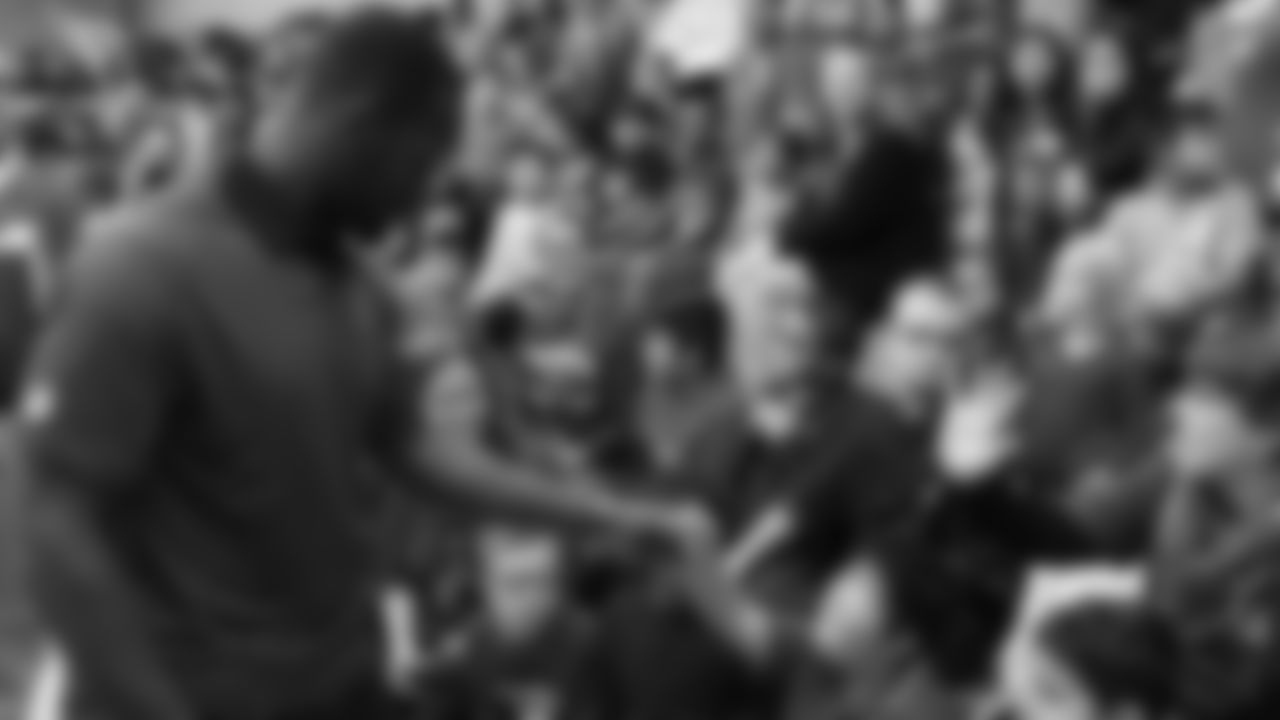
A fist bump between Derrick Coleman and a student.

Derrick Coleman speaks alongside an interpreter.

A student tells Derrick Coleman -- in sign language -- that he dances well.
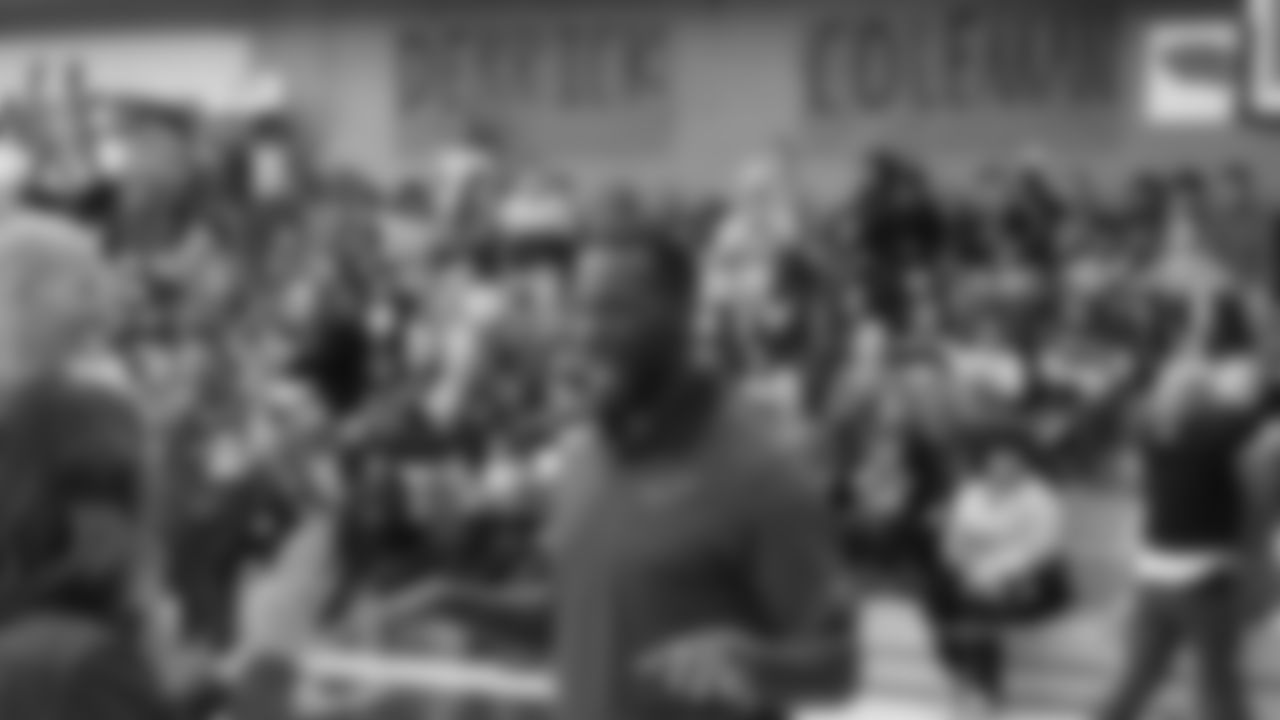
Derrick Coleman gets ready to talk to the students.
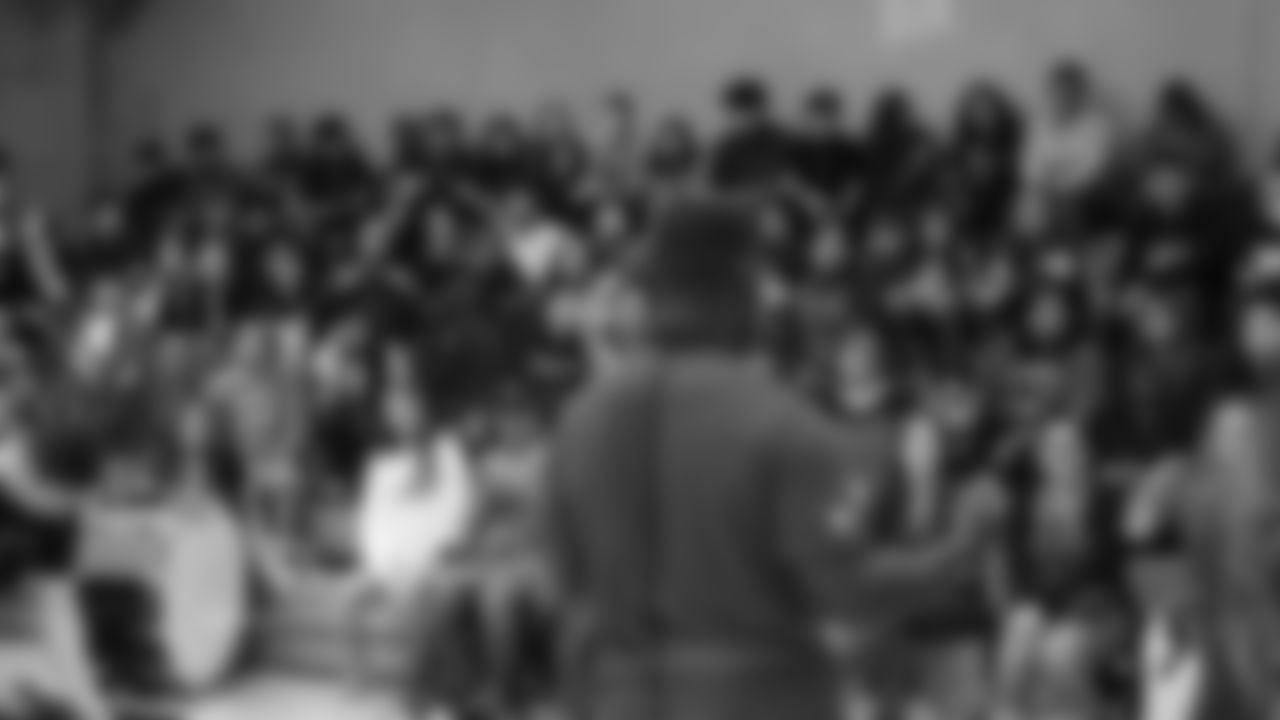
The students pay close attention to the message.
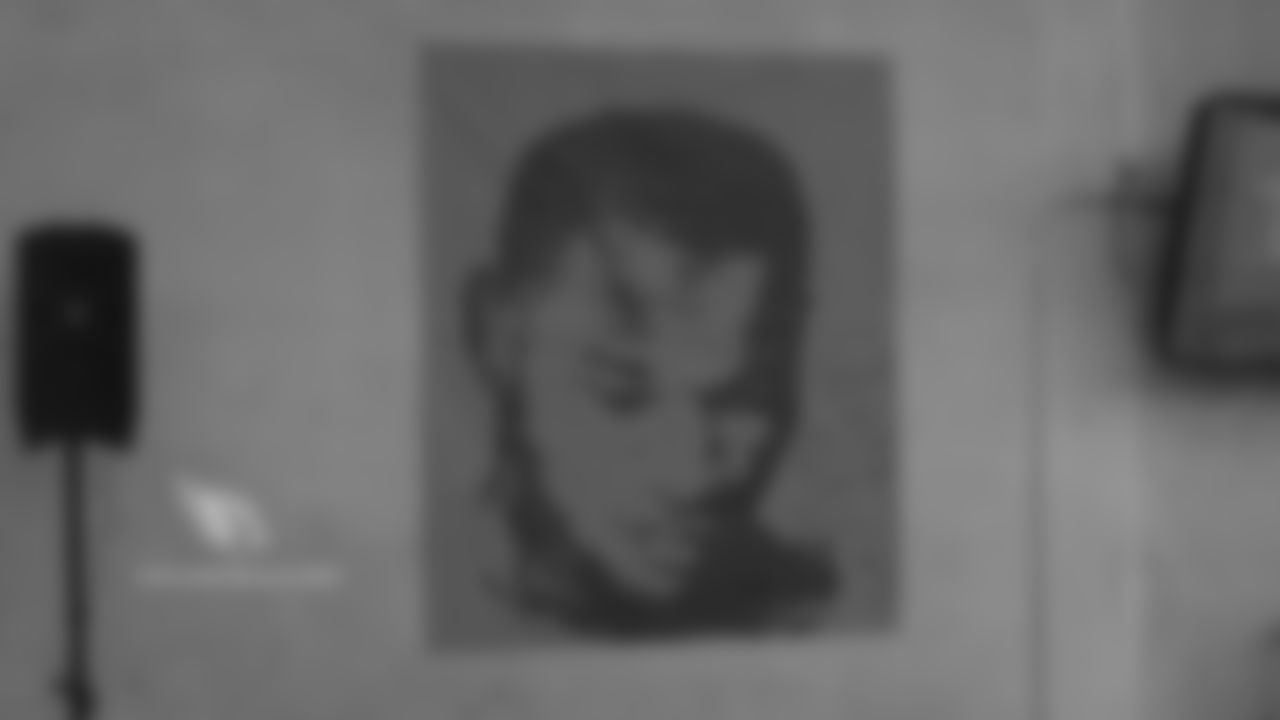
A drawing of Derrick Coleman, a copy of his book jacket photo, hangs on the wall.
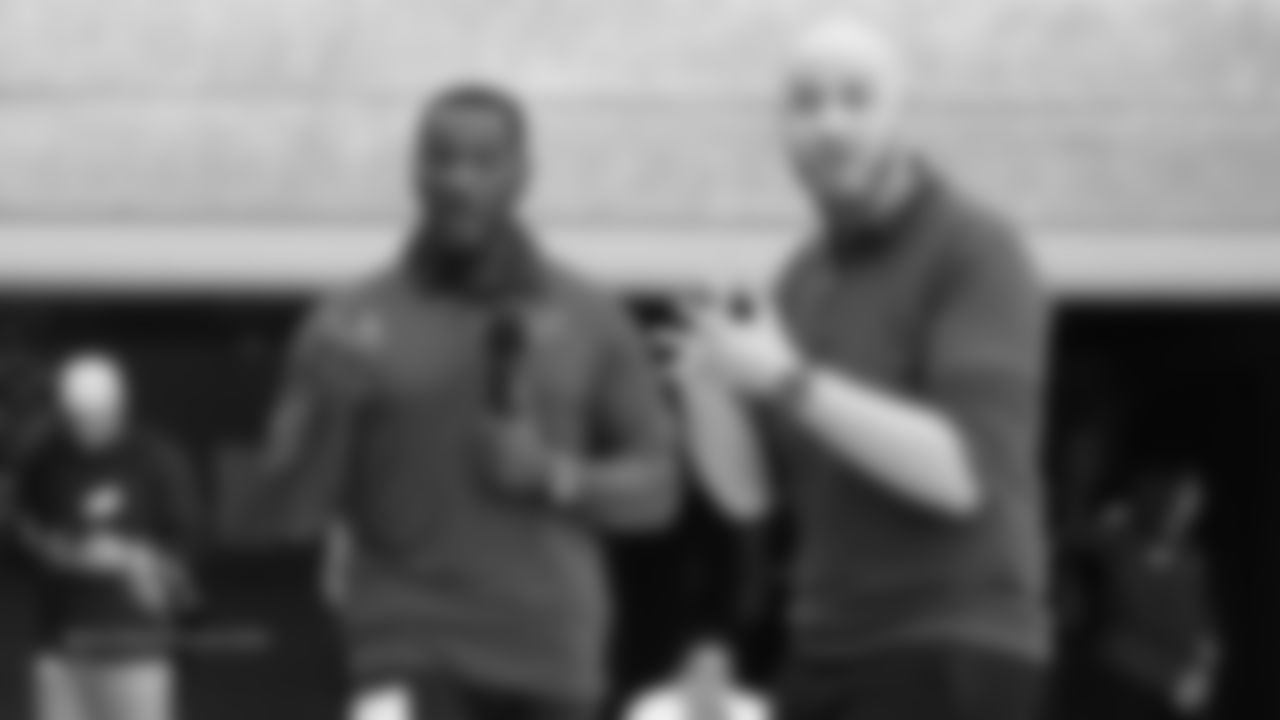
Derrick Coleman speaks with the help of an interpreter.
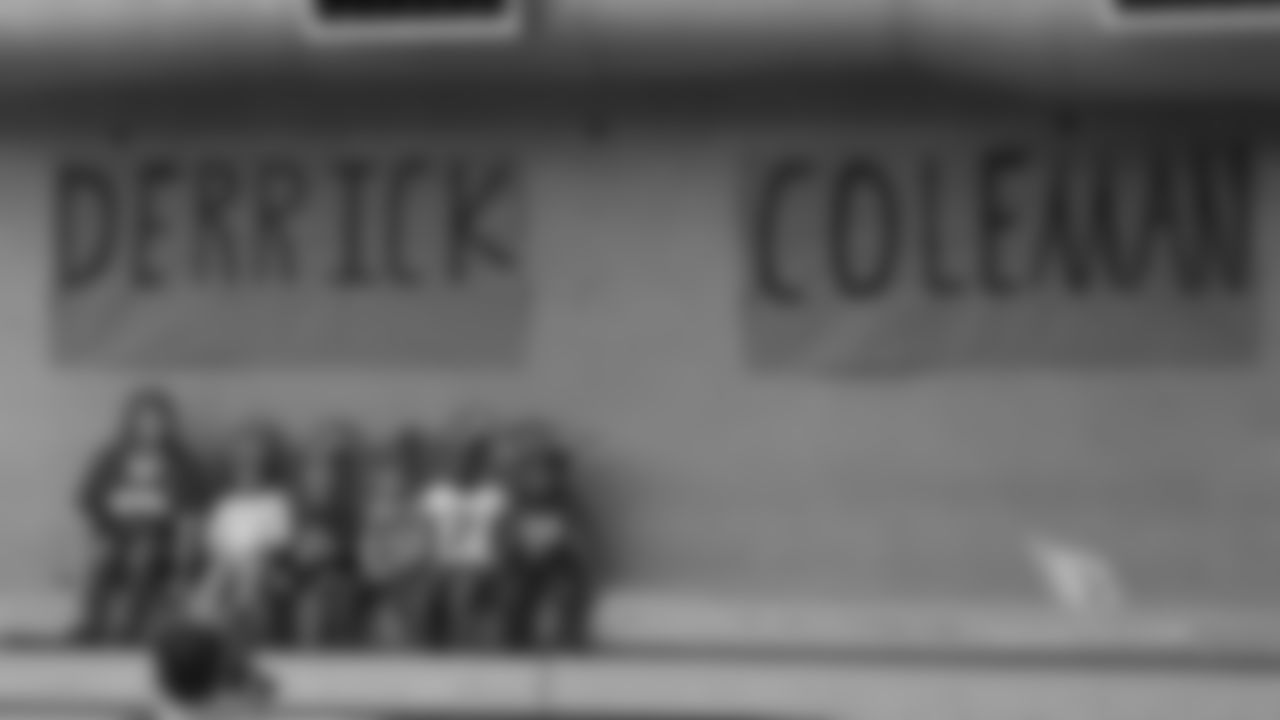
The first children show up -- wearing bird heads.

Coleman and the students sign "love" for a post-speech picture.
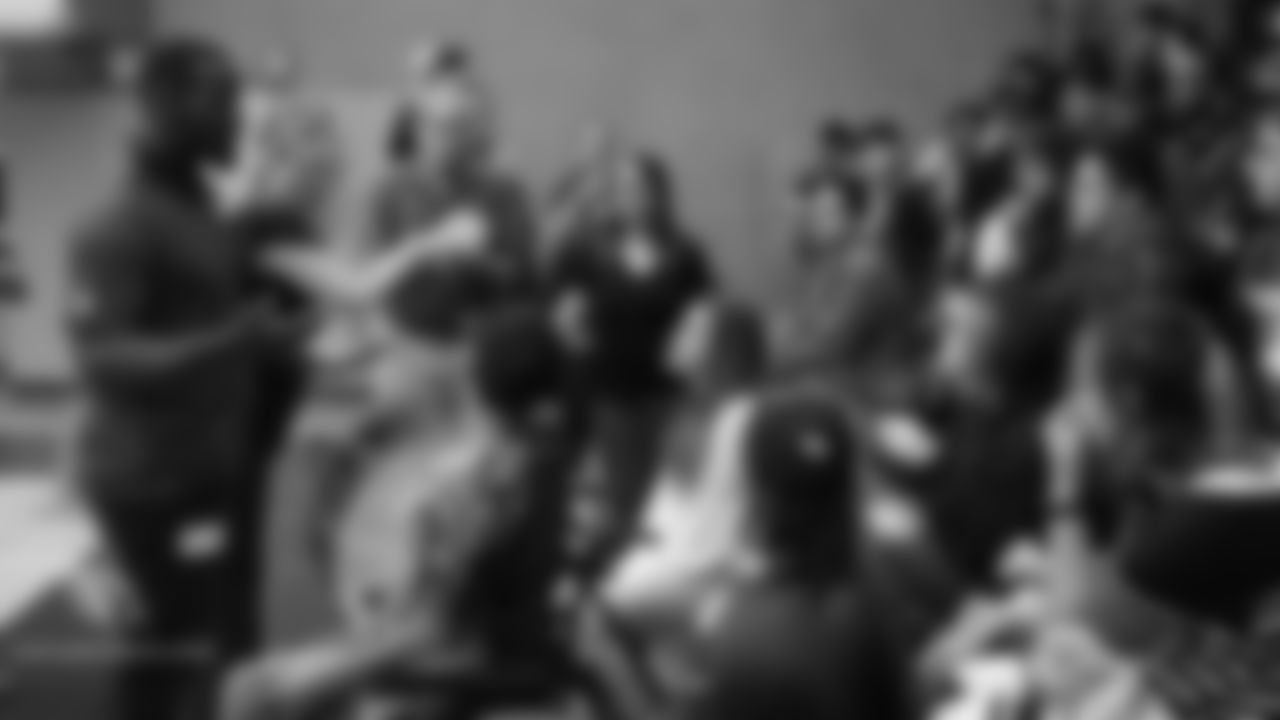
Derrick Coleman talking to the kids.
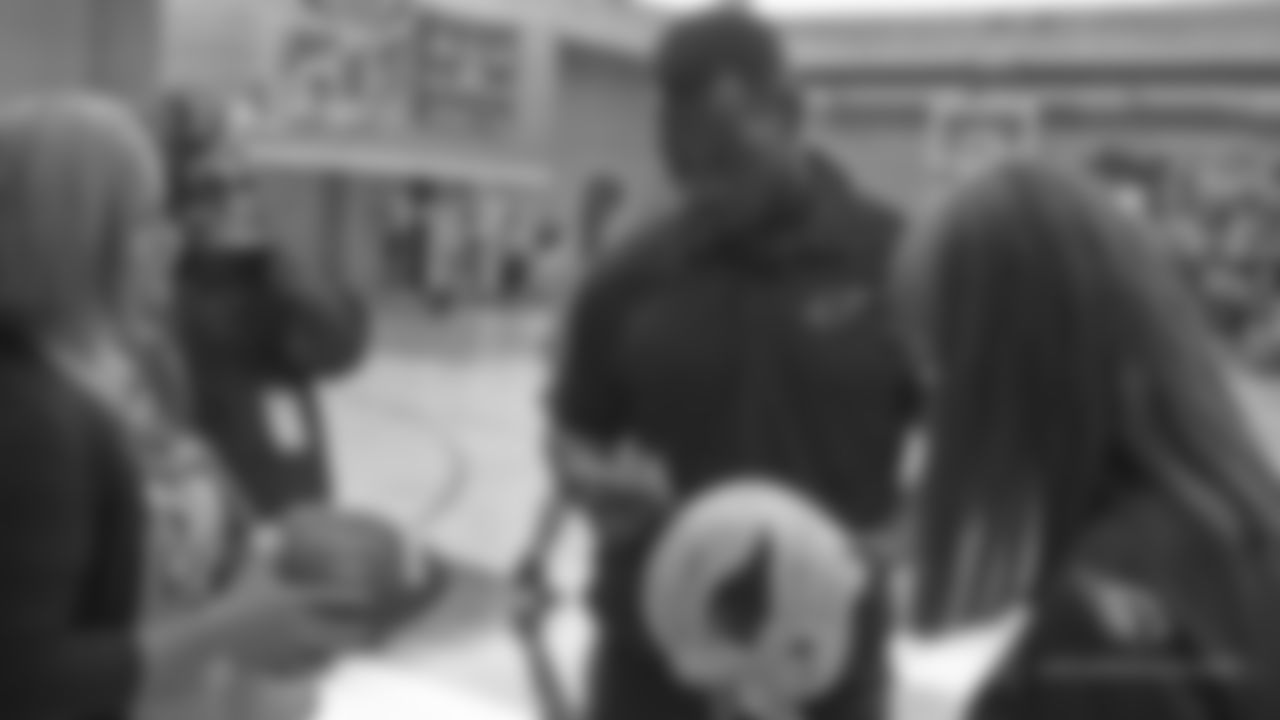
Derrick Coleman signs the schools' Cardinals helmet.
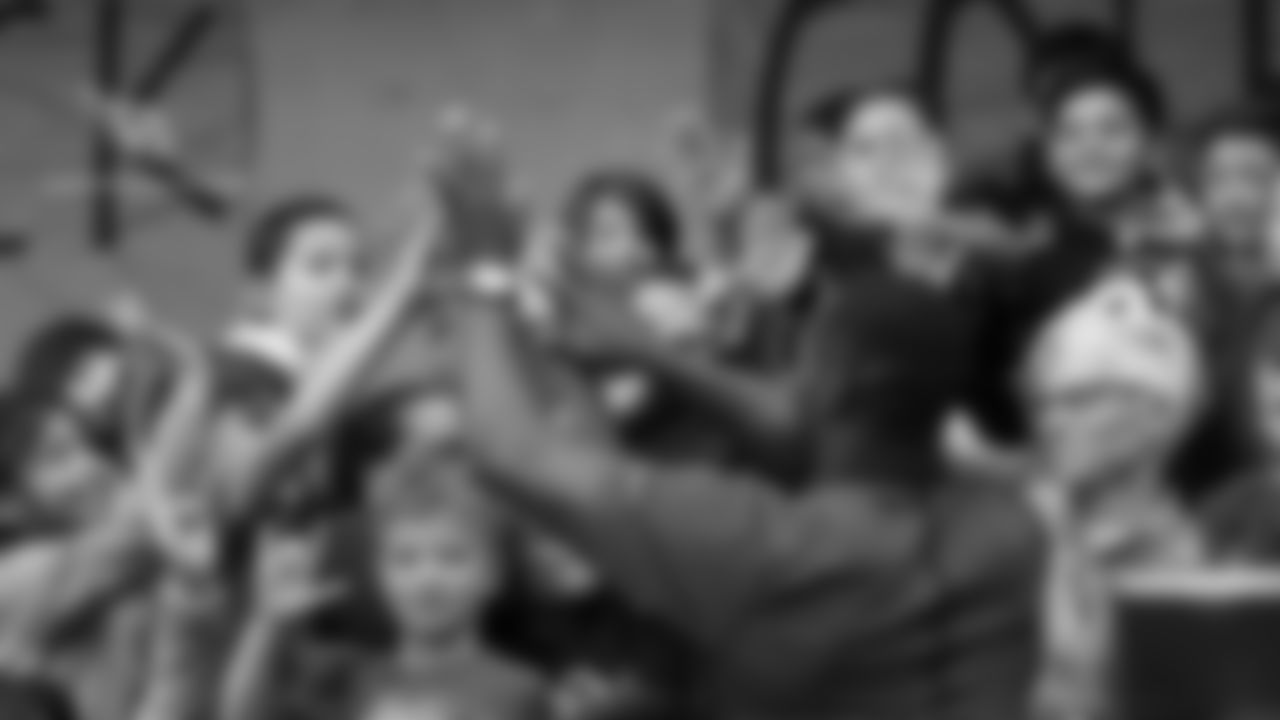
Derrick Coleman high-fives some students.

Derrick Coleman in the middle of his fans.
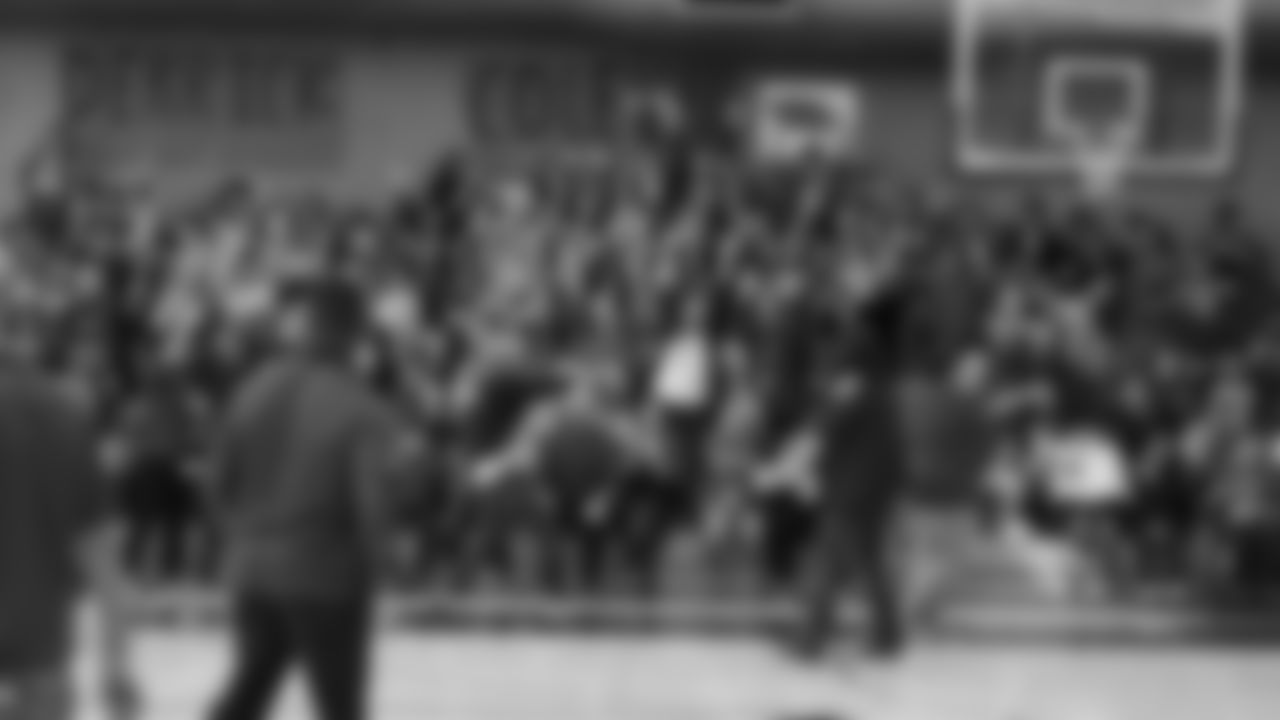
The students greet Derrick Coleman.

Derrick Coleman signs the poster of his face.
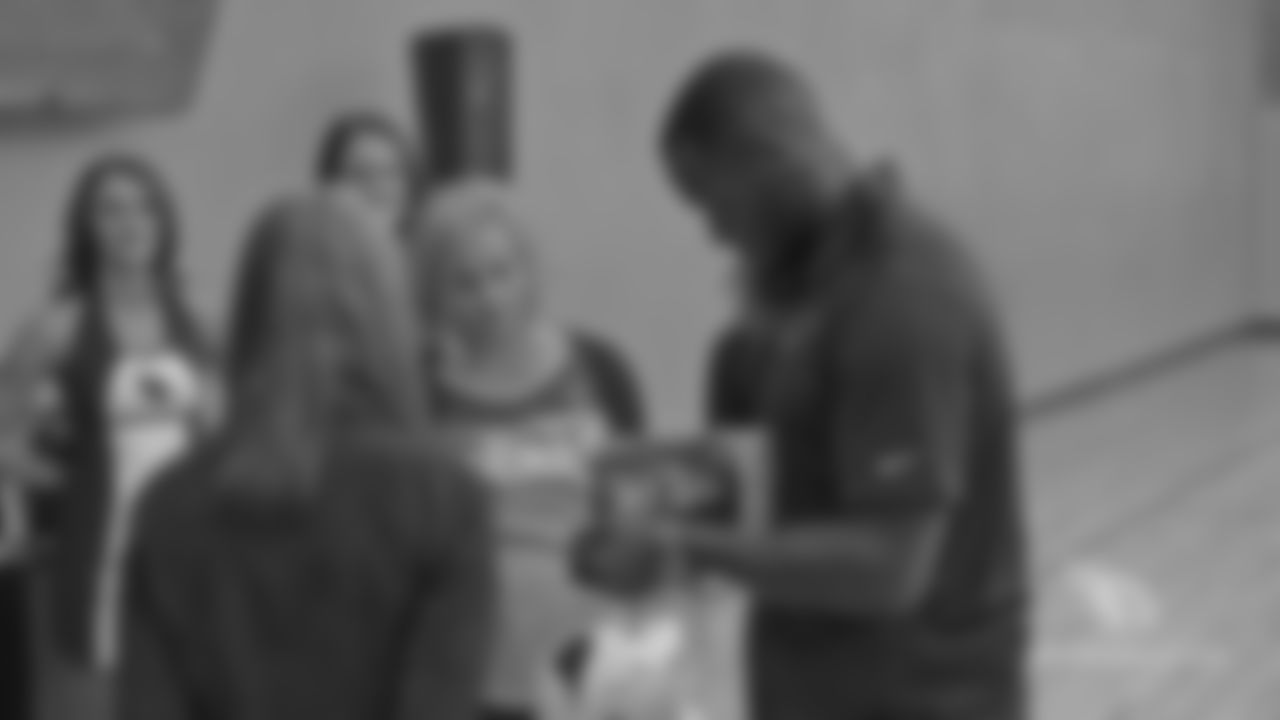
Derrick Coleman autographs a copy of his book.















